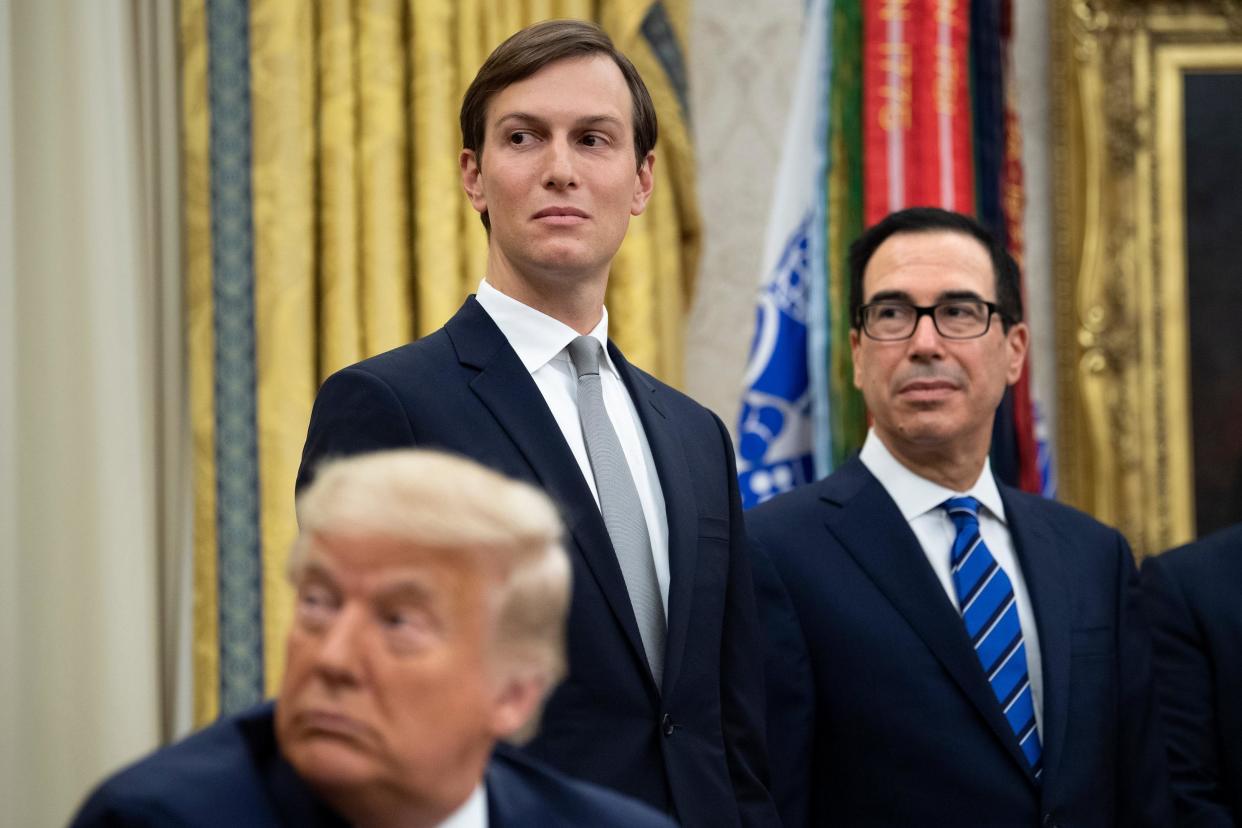What is inside the White House agreement with Israel and UAE?

Donald Trump has announced the “full normalisation of relations” between Israel and the United Arab Emirates, suspending Israel’s efforts to declare sovereignty over a third of occupied West Bank territories to instead focus on “expanding ties with other countries in the Arab and Muslim world”.
“Everybody said this would be impossible,” the president said from the Oval Office on Thursday.
According to the agreement, delegations from the countries will meet in the coming weeks to sign bilateral agreements on tourism, air travel, security, telecommunications, energy, healthcare, and the establishment of embassies in each other’s nations.
Confirming the agreements established in the White House “Abraham Accord” announcement, Israeli Prime Minister Benjamin Netanyahu called the announcement a “historic day,” while Emirati leader Mohammad bin Zayed said the agreement establishes a “a roadmap towards establishing a bilateral relationship”.
The UAE is only the third Arab nation to maintain active diplomatic ties with Israel, joining Egypt and Jordan.
The move follows a 28 January agreement, orchestrated by the president’s son-in-law Jared Kushner, which gave Israel immediate permission to extend sovereignty while carving out what critics have argued is a harsh path to limited statehood for Palestinians. The US supported the annexation of settlements in the West Bank and Jordan Valley.
Thursday’s agreement appears to suspend those plans, but the prime minister announced that there will be “no change” in his annexation plans.
Palestinian officials were excluded from negotiations and have rejected plans from the White House, while UAE officials have warned that Israel’s annexation efforts would upend relationships throughout the Arab world.
“Annexation will definitely, and immediately, reverse all of the Israeli aspirations for improved security, economic and cultural ties with the Arab world and the United Arab Emirates,” wrote Emirati ambassador to the US Yousef al-Otaiba in an Israeli newspaper in June.
Palestinians have demanded that Arab nations not normalise diplomatic efforts with Israel until it ends the occupation of dozens of territories that have been declared illegal under international law.
Thursday’s agreement does not appear to suspend the US-Israel deal, but instructs parties to “continue their efforts in this regard to achieve a just, comprehensive and enduring resolution to the Israeli-Palestinian conflict”.
“As set forth in the Vision for Peace, all Muslims who come in peace may visit and pray at the Al Aqsa Mosque, and Jerusalem’s other holy sites should remain open for peaceful worshippers of all faiths,” according to the announcement.
Senior Palestinian official Hanan Ashrawi criticised the agreement, arguing that ”Israel got rewarded for not declaring openly what it’s been doing to Palestine illegally [and] persistently since the beginning of the occupation”.
While the president’s announcement from the White House did not mention Palestine or Palestinians, officials did discuss Iran, and suggested that regional diplomatic efforts among Arab nations coupled with Israel’s geopolitical ties with the US are aimed at containing Iran.
The president’s announcement follows recent remarks at a campaign fundraiser in New Jersey, where he claimed that the US would secure a nuclear deal with Iran within “four weeks” of his re-election, following his controversial withdrawal from a 2015 agreement to limit Iran’s nuclear capacity in exchange for the lifting of crippling economic sanctions.
The Independent‘s request for comment to his campaign was referred to the White House, and the State Department declined to comment on his remarks.
The plan comprises part of what the administration sees as a “Strategic Agenda for the Middle East” – one that appears to dismiss Palestine as a priority and focus instead on building more diplomatic ties with other states.“
“Along with the United States, Israel and the United Arab Emirates share a similar outlook regarding the threats and opportunities in the region, as well as a shared commitment to promoting stability through diplomatic engagement, increased economic integration, and closer security coordination,” according to the announcement.
Mr Trump characterised Thursday’s agreement as a “testament to the bold diplomacy and vision of the three leaders and the courage of the United Arab Emirates and Israel to chart a new path that will unlock the great potential in the region.”
US Secretary of State Mike Pompeo, who compared the announcement to peace agreements between Israel and Egypt and Jordan, each signed more than three decades ago, said that the agreement “holds similar potential and the promise for a better day for the entire region.”
The agreement also follows Netanyahu’s June announcement to partner with the UAE against the coronavirus pandemic, a deal that Emirati officials contradicted hours later, saying it was merely an agreement between two UAE companies and two Israeli companies.
But under the new agreement, the countries will “immediately expand and accelerate cooperation” for Covid-19 vaccine development.
It’s unclear whether officials will adhere to the agreement and whether other Gulf nations will follow. It also relieves Prime Minister Netanyahu from attempts to annexe territories, which has been met with US indifference and international opposition.
The announcement also falls short of White House pledges to bring ”peace” in the Middle East, now an election eve promise less than three months before a crucial November election.
While the president’s political opponent Joe Biden has criticised the administration’s decision to move Israel’s US embassy from Tel Aviv to Jerusalem, undermining a Palestinian capital, he has said he would be reluctant to move it back if elected.
Read more
The UAE-Israel deal makes Middle East diplomacy ever more complicated
UAE formally recognises Israel in historic move, Trump announces
Anti-Netanyahu sentiment and coronavirus spread in Israel
How did we get here on Israeli annexation? It’s all in one document

